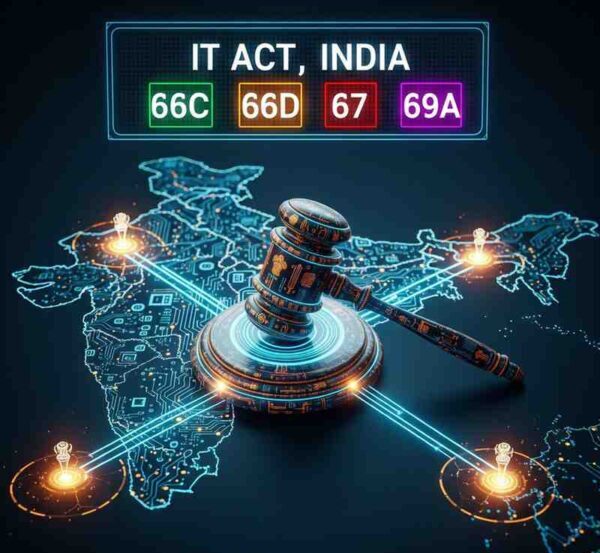Cyber Laws in India: Understanding IT Act Sections 66C, 66D, 67 & 69A
Understand the essential provisions of India’s IT Act, 2000, that deal with cybercrime. Learn in detail about Section 66C (Identity Theft), Section 66D (Online Cheating), Section 67 (Obscene Material Online), and Section 69A (Website Blocking). Discover penalties, real-life relevance, and how these laws protect digital safety.
Introduction: Cybersecurity and the Law
With India’s rapid digital transformation, cybercrimes have also seen a massive rise. From online banking fraud to fake social media accounts and objectionable content circulation, the threat to individuals and organizations is real. To combat this, the Information Technology Act, 2000 (IT Act) was introduced. Over the years, it has been amended to address newer challenges.
Among its many provisions, four key sections stand out for everyday internet users: Section 66C, Section 66D, Section 67, and Section 69A. These sections cover identity theft, online fraud, sharing obscene content, and blocking websites. Let’s dive into the details.
Section 66C: Identity Theft
What it covers:
Section 66C deals with cases where a person dishonestly uses another individual’s identity information, such as a password, digital signature, or biometric data. This includes creating fake accounts on social media, stealing someone’s credit card details, or impersonating them online.
Punishment:
- Imprisonment up to 3 years
- Fine up to ₹1 lakh
Example:
If someone hacks your email account and uses it to send messages pretending to be you, it falls under Section 66C. Similarly, if your Aadhaar or PAN number is misused for fraudulent transactions, it is identity theft.
Why it matters:
In an era where personal data is easily available, protecting one’s digital identity is crucial. This law ensures accountability and deterrence.
Section 66D: Online Cheating and Impersonation
What it covers:
Section 66D punishes cheating by impersonation using computer resources or communication devices. In simpler terms, if someone pretends to be another person online to deceive others for monetary or personal gain, this section applies.
Punishment:
- Imprisonment up to 3 years
- Fine up to ₹1 lakh
Example:
- Online job scams where fraudsters pretend to be HR representatives of reputed companies.
- Fake lottery messages or phishing emails that trick people into sharing bank details.
- Fraudulent calls posing as government officials or bank executives.
Why it matters:
Online scams are one of the most common cybercrimes in India. Section 66D provides legal protection for victims and ensures fraudsters are penalized.
Section 67: Publishing Obscene Material Online
What it covers:
Section 67 makes it illegal to publish, transmit, or share obscene or sexually explicit content on the internet. This includes images, videos, or any digital content that is considered obscene under Indian law.
Punishment:
- First conviction: Up to 3 years imprisonment + fine up to ₹5 lakh
- Subsequent conviction: Up to 5 years imprisonment + fine up to ₹10 lakh
Example:
- Circulating pornographic clips via WhatsApp or social media.
- Running websites or channels with obscene content.
- Revenge porn cases involve private photos or videos being shared without consent.
Why it matters:
This law is crucial for protecting individuals, especially women and minors, from exploitation, harassment, and the circulation of non-consensual content.
Section 69A: Power to Block Websites
What it covers:
Section 69A gives the Government of India the power to block public access to information through any computer resource. This usually applies to websites or online platforms that pose threats to national security, public order, or morality.
Punishment (for non-compliance):
- Up to 7 years imprisonment
- Possible fines
Example:
- Any site involved in distributing false news, inciting hatred, or promoting terrorism may face a ban.
- Ban on certain apps/websites in India that threaten sovereignty or data security.
Why it matters:
While it empowers the government to ensure safety and sovereignty, Section 69A is also debated for possible misuse. It is often invoked in cases of app bans and censorship.
Conclusion: Importance of Cyber Laws in Daily Life
Cybercrime is no longer limited to hackers targeting big corporations; ordinary people fall victim every day through phishing links, fake calls, obscene forwards, or fraudulent online profiles.
Sections 66C, 66D, 67, and 69A of the IT Act play a vital role in safeguarding the digital rights of citizens. They:
- Protect identity and financial data (66C & 66D)
- Safeguard dignity and morality online (67)
- Ensure national security and responsible digital governance (69A)
As India moves deeper into the digital age, awareness about these laws is essential for both prevention and protection.
Being aware of cyber laws is the first step toward digital safety.
💬 Have you or anyone in your circle ever been a victim of cyber fraud or online harassment? Share your experience in the comments.

























